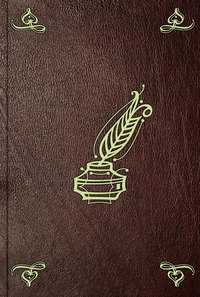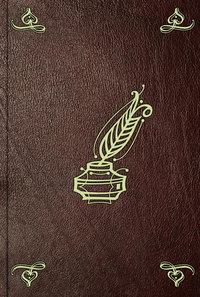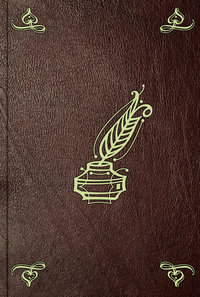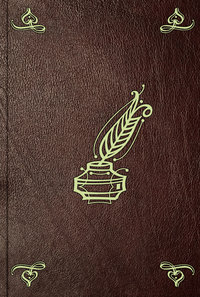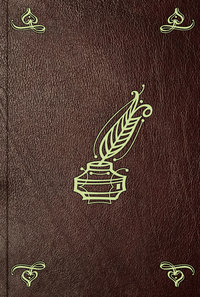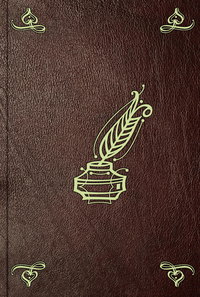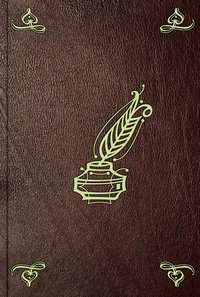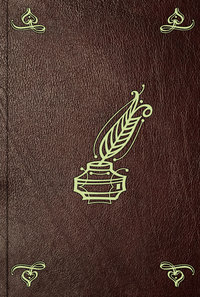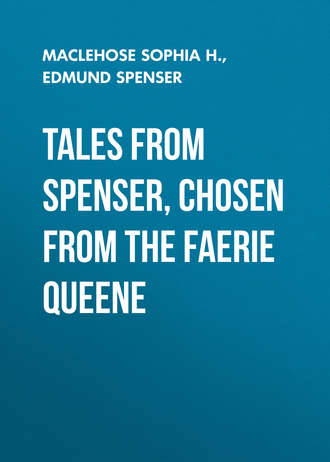 полная версия
полная версияTales from Spenser, Chosen from the Faerie Queene
This wondrous shield, with the rich sword and armour, had been made for Prince Arthur by Merlin, the great and good magician.
Timias, the Prince's squire, was a gentle youth. He bore a spear of ebony, with a square pike head, which had been three times heated in the furnace; and he rode a proud and stubborn steed that chafed under its rider, but was kept well in hand.
As Prince Arthur approached the lady, he spoke courteously to her, and when he perceived that his words drew forth slow and unwilling answers, he guessed that a secret sorrow rent her heart. He then tried to draw from her the cause of her distress, until, moved by his kind words, Una spoke.
"What happiness," she asked, "could reach a heart plunged in a sea of sorrow, and heaped with huge misfortunes?" As soon as she thought of her distress a cold chill crept over her, and she felt as if stung by an iron arrow. Griefs which could not be cured were best not spoken of, – she could only weep and wail.
Then said the Prince – "Ah! dear lady, well do I believe that your grief is a heavy one, for only to hear you speak fills my soul with sadness; but let me entreat of you to unfold it, for counsel eases the worst sorrow."
"But great grief," said Una, "will not bear to be spoken of; it is easy to think about, but hard to utter."
"True," replied the Prince, "but he that wills not, can do nothing."
"Ah!" pleaded Una, "but grief that is spoken, and finds no relief, grows still heavier, and leads to despair."
"Not so," said the Prince, "when there is trust and faith."
And thus was Una at length persuaded to disclose her secret sorrow.
She told the Prince the story you already know: how her dear parents were imprisoned by a huge dragon, and how the Red-cross Knight, who was to have rescued them, had been betrayed into the hands of a cruel giant, in whose dungeons he lay, disarmed and helpless.
Before she had quite ended her tale, the poor damsel grew faint from grief and dread, but the Prince comforted her with cheering words.
"Truly," he said, "you have great cause of sorrow; but take comfort and courage, for until I have rescued your captive knight be assured that I will not leave you."
So the whole party went on together, until they reached a great castle. Here, said the dwarf, lay his luckless lord, and here the Prince must try his prowess. Whereupon the Prince alighted from his steed, and bidding Una remain where she was and watch the issue of the fight, took Timias, his squire, and strode up to the castle wall. He found the gates fast closed, and no one to keep guard or answer to his call. At this, the squire blew a small bugle, which hung by his side, adorned with twisted gold and gay tassels, and writ all over with the wonders of its virtue.
None ever heard its shrill call who did not tremble before it. There was no gate however strong, or lock however firm, that did not burst open at its summons. And now, as the squire blew the magic horn, the grim castle quaked, every door flew open, and the giant himself rushed forth with an angry stare on his cruel countenance, eager to learn who or what this might be that had dared his dreaded power. After him appeared Duessa, riding a many-headed monster, with a fiery, flaming tongue in every one of its many heads.
At once the Prince began a furious attack on the monster. Thereupon the giant buckled to the fight, and lifting up his dreadful club, all armed with ragged knobs and gnarled knots, thought to have slain the Prince at a single blow. But he, wise and wary, leapt swiftly aside, and the great weapon fell so heavily, that it sank three yards deep into the ground, making the earth tremble. Now, Orgoglio could not easily uplift his club, and as he strove to drag it from the deep cleft, the Prince smote off his left arm, which fell to the ground, a senseless block, while streams of blood gushed from the wound. Dismayed by the pain, Orgoglio roared aloud, and Duessa hastened to draw up her many-headed charger to his aid. But the squire soon forced the horrid beast to retreat, and at this Duessa in her pride rebelled and urged the monster afresh; but in vain, for Timias dealt mighty strokes, and stood firmly to his post.
Then Duessa resorted to her witch ways, and taking out a golden cup, murmured enchantments over it, and sprinkled some of its contents upon Timias. His courage immediately faded away, and his senses became dull and numb, and he fell helpless before the monster.
The dreadful beast laid its claws upon Timias' neck, and kept him pinned to the ground, until his life was nearly crushed out: then it left him with neither power nor will to rise.
But when Prince Arthur beheld the sad plight into which his well-loved squire had fallen, he left off fighting with Orgoglio, and turned upon the beast, and struck off one of its monster heads.
Thereupon Orgoglio went to Duessa's aid, and putting all his force into his remaining arm, he let drive his oaken club with such terrible fury, that falling on the Prince's shield, it bore him to the ground.
But as Prince Arthur fell, his shield became uncovered, and suddenly there blazed forth a light of such dazzling brightness, that no eye could bear it. The giant let his arm drop to his side, and the many-headed beast turned blind and staggered so that Duessa cried out wildly, "O! help, Orgoglio, help, or we perish all!"
The giant was moved by her piteous cry, and strove to wield his weapon in her aid, but all in vain, for the bright shield had sapped his powers.
And now Prince Arthur struck at him, smiting off his right leg, and while he lay prostrate and helpless, leapt lightly upon him, and smote off his head. Lo! Orgoglio's body shrank away, and nothing was left but an empty dried-up skin – such is the end of pride.
When Duessa saw the grievous fate of Orgoglio, she cast away her golden cup, and fled fleetly from the bloody scene; but the squire, light of foot as she, speedily brought her back captive.
And now Una, who had watched the fight from afar, came forward with sober and modest gladness, hardly able to find words with which to greet and thank the victor, declaring that heaven, not she, must requite him the service he had done. She then went on to pray that since heaven and his prowess had made him master of the field, he would end that he had so fair begun, and would rescue her Red-cross Knight from the deep dungeon in which he lay.
Thereupon the Prince gave Duessa into the charge of Timias, while he himself proceeded to make forcible entrance into the castle. No living creature did he see, and when he called aloud, no man answered to his cry; but a solemn silence reigned in hall and bower.
At length there came forth an old, old man, with a beard as white as snow, who walked along with a creeping, crooked pace, and leant his feeble steps on a staff, groping his way, for his eyesight had failed him long ago. On his arm hung a bunch of keys, overgrown with rust: these were the keys of the inner doors, but he could not use them, and only kept them by him from ancient custom. It was a strange sight to watch his feeble pace, for as he moved slowly forward his face was seen to be turned backward. He was the ancient keeper of the place, foster-father to the slain Orgoglio, and his name, Ignaro, betrayed his true nature.
But the Prince honoured his grave and reverend appearance, and asked him gently where were all the dwellers in the castle, to which he replied in a quiet voice that he could not tell. Again the Prince asked where the knight whom Orgoglio had vanquished lay captive, and Ignaro replied he could not tell. Then the Prince inquired by which way he might pass into the castle, and still the old man said he could not tell; whereupon the Prince, courteous as he ever was, grew displeased, and thinking that Ignaro mocked at his questions, upbraided him, and demanded an answer befitting the gravity of the old man's years, but the reply was ever the same, he could not tell.
At this the Prince looked attentively at the aged sire, and, guessing that he was indeed ignorant, stayed his wrath in pity for his imbecility, and, stepping up to him, took the bunch of keys from his unresisting hand, and made free entrance for himself. He opened all the doors, and neither bar nor foeman presented any hindrance. He found all within furnished with great richness and splendour, but everywhere he beheld traces of the giant's cruelty. He sought through every room and every bower, but nowhere could he find the Red-cross Knight.
At length, Prince Arthur came upon an iron door, which was fast locked. He searched among the keys, but in all the bunch there was not one to open it. Presently he espied a small grating in the door, and through this he called with all his strength that he might discover whether any living wight were imprisoned there.
By-and-bye he heard a hollow, dreary, murmuring voice. It asked who this might be that brought tidings so welcome as the news of death to one who had lain dying for three weary months, but yet lived on.
When the Prince heard this sad plaint, his heart thrilled with pity and indignation, and he rent open the iron door in fierce fury; but when the iron door was open, there was nothing before him but a deep descent, dank, dark, and foul. However, neither the darkness nor the foulness could stay the strong purpose of the Prince, and after long labour and great perseverance, he succeeded in finding means whereby to rescue the prisoner from the dismal hole.
But alas! when the knight was lifted out, he presented a sad spectacle of ghastly suffering. His feeble limbs could scarce support his body, his eyes were dull and sunken, and could ill bear the light, his cheeks were thin and hollow, his once powerful arms wasted away, and his whole appearance was withered and shrivelled.
When Una saw him she ran towards him, tears in her eyes, and joy and sadness mingled in her feelings, and as soon as she could speak for her tears, she exclaimed, "Ah, dearest Lord, what evil power hath thus robbed you of yourself, and marred your manly countenance? But welcome now, whether in weal or in woe."
The knight was too feeble to answer, and the Prince replied for him, saying that nothing was gained in recounting woes, since the only good to be had from past peril is to be wise and ware of like again.
He then asked Una what he should do with Duessa, the false witch. Una declared that to have her die would be too spiteful an act, and, therefore, having despoiled her of the scarlet and purple robes, and rich ornaments, with which she imposed upon men, they let her go, and Una and the knights remained in the castle to rest a while.
But this rest was not sufficient to fit the Red-cross Knight for his approaching conflict with the dragon, and so Una, seeing that his limbs were weak, and his spirit damped by the long and miserable imprisonment, conducted him to an ancient house, called the House of Holiness, in which she knew they would have a kind welcome and good food.
In this house they remained for some time, and here the knight met an aged sire, who told him many curious things concerning his origin. The knight rejoiced greatly as he heard that he was descended from ancient Saxon kings, and was destined to do great deeds for his native land.
Inspired with fresh courage he returned to Una, who had been resting with the good lady Charity, and her women, in their side of the great House of Holiness. After many thanks rendered and many blessings bestowed, they once more set out to find the Dragon.
How the Red-cross Knight slew the Dragon
Faerie Queene. Book I. Cantos XI., XIIAs Una and the Red-cross Knight rode on their way they came near her father's wasted lands and the brazen tower in which her parents were imprisoned.
"Dear Knight," said Una, "we are now come where our peril must begin," and warning him that they might encounter the dragon at any moment she prayed him to be constantly on his guard.
As she spoke, the maiden pointed out the tower, and at the same time a hideous roar filled the air with horror. They looked up and beheld the dragon stretched out on the sunny side of a hill. The moment that the monster saw the knight's shining armour, he raised his great frame and hastened towards them as if delighting at the prospect of fresh prey.
Then the knight bade Una leave him and withdraw to a hill at a little distance, where she could watch the fight and yet be secure from danger.
The dreadful beast came on steadily, half walking, half flying in his haste. He covered the ground quickly, and as he went, cast a huge shadow over the wasted land.
As the dragon approached the knight, he reared his monstrous body on high, which looked the more horrible that it was swollen with wrath and venom. It was covered with brazen scales, so closely placed, that nothing could pierce them, and the dragon shook the scales until they sounded like the clashing of armour. He had wings which he spread out like great sails, and when these smote the air, the clouds fled in terror before them, and the heavens stood still in astonishment. His tail was twisted in a hundred folds, and lay over his scaly back, and when he unfolded its coils and displayed its full length, it swept the land behind him for three furlongs. At its extremity were inserted two deadly stings, sharper than the sharpest steel. And still sharper and more cruel were his claws; so cruel and ravenous, that all they touched, and all they drew within their reach, suffered certain destruction.
But most fearful of all was the dragon's head. It had deep-set eyes, that burned with rage, and shone forth like shining shields; and gaping jaws, in which were set three rows of iron teeth. From these trickled the blood of the creatures he had lately devoured, while from between his jaws issued clouds of smoke that filled the air with sulphurous stench.
Such was the foe the Red-cross Knight must face and conquer.
On came the dragon, raising his haughty crest, shaking his scales, and hastening so joyously to the combat, that the knight inwardly quaked for fear.
And now began the first of three days' mortal strife.
The Red-cross Knight couched his spear, and ran fiercely at his foe. The spear did not wound, but it annoyed the dragon: he turned aside, and as he turned, swept both the horse and its rider to the ground. In a moment the knight had risen, and renewed the attack. Never before, although many a knight had fought with him, had the dragon felt such force in the arm of a foe, and yet the deadly thrusts glanced back from his well-armed breast, leaving him unhurt.
But the knight's persistent attacks roused the monster's rage. He spread his great wings, and lifting himself into the air, swooped down upon his foe, and seized both horse and man in his cruel claws. He carried them an arrow's shot, when their fierce struggles obliged him to let them fall; and the knight, putting the force of three men into a single blow, once more aimed his spear at the impenetrable scales. Again the blow glanced aside, but this time it glided close under the dragon's upraised wing, and there inflicted so sore a wound, that the monster, unaccustomed to pain, roared aloud with a noise like that of the ocean in a wintry storm.
The weapon stuck in the dragon's flesh, until he contrived to tear it out with his claws, whereupon black blood streamed forth from his wound, and flames of fire from his nostrils. In his rage, he flung his great tail about: it twisted round the horse's legs, and the steed in its effort to get free, only became the more entangled, and at length was forced to throw the knight. Quickly he arose, and laying hold of his powerful sword, struck the dragon a stroke that seemed as if it must prove fatal. But the hardened iron took little effect upon the still more hardened crest, although it fell with a force that made the dragon careful to avoid its blows.
The knight grew angry when he saw his strokes of no avail, and struck again with greater might, but the steel recoiled, leaving no mark where it had fallen.
Now the dragon was suffering from the wound under his wing, and impatient of the pain, tried again to rise into the air. But the injured wing impeded his effort, and full of rage and disappointment, he uttered a roar such as had never before been heard, and once more sent out flames of fire. These came right into the face of the knight, and making their way through his armour, burned him so sorely that he could hardly endure its weight. Faint and weary, burned, and sore with his wounds, worn out with heat and toil, and the very arms he bore, death seemed to him much easier than life. "But death will never come when needs require," and his despair well nigh cost him dear.
The dragon, seeing his discomfiture, turned upon him, and smiting him with his tail, felled him to the ground. Very near, then, was the knight to the death he coveted.
However, it so happened that, unknown to him, a well of rare virtue lay close by. Its waters could cure sicknesses, make the aged young, wash sinful crimes away, and even restore the dead to life. In the happy days before the accursed dragon had brought ruin to the land, it had been called the Well of Life; and though he had denied its sacred waters with innocent blood, it still retained many of its ancient virtues. Into this spring the knight fell.
And now the sun began to set, and Una, watching from her hill, saw her champion fall, and saw, too, that the monster swelled out his proud breast, and clapped his great wings as if in victory. Little knowing the boon that had befallen her knight, the maiden grew very sad at heart, thinking all was lost. No sleep was possible to her. With folded hands, on lowly knees, she spent the long anxious hours in earnest prayer.
When morning came, Una arose and looked anxiously around to see if, haply, she might discover the warrior still alive, for with the morning new hopes frequently arise. By-and-bye, to her great joy, she saw him start up, all fresh and invigorated by the powers of the wondrous well. The dragon was confounded at the sight, and knew not whether this was his foe of yesterday, or another come to take his place, when the knight uplifted his bright blade, and struck the monster a blow upon the skull, which wounded him in right earnest.
Whether the sword had received some secret virtue from the waters of the well, or whether they had only increased the strength of the knight's right arm, none can tell, but never before had a blow taken such effect on the cruel monster. He yelled aloud as if he were a hundred lions all in one; he tossed his great tail aloft, and scourged the air into a tempest, and flung about its mighty length, so that it overthrew high trees, and tore rocks into pieces. Then advancing his tail high above his head, the dragon struck the knight and smote him to the ground. The cruel sting pierced through his shield and fixed itself in his shoulder. There it remained, causing him very severe pain.
The knight was nearly overcome, but more mindful of the issues involved in the combat than of his own suffering, he rose and tried to free himself. Unable to loose the sting, and inflamed with wrath and anguish, he struck the dragon on the tail, and at one blow cut off five of the mighty joints. Deeply enraged, the creature thought to avenge himself once for all, and gathering himself up, fell fiercely on the knight's shield, and kept fast hold of it.
And now was the Red-cross Knight terribly encumbered. Three times he strove to release his shield from the dragon's clutch, and three times failed. In despair he summoned his trusty sword to his aid, and laid about with it so ruthlessly that at length the creature was forced to withdraw one foot in order to defend himself. Then the knight directed all his blows against the other foot, still fast fixed on the shield, until, by happy fortune, the sword fell upon the ankle-joint, and severed it.
Upon this there burst forth from the beast such smoke and flames and brimstone as to dim the light of heaven itself and force the warrior to retreat, lest he should be scorched alive. As he did so, his weary feet slipped, and he fell down, sore terrified with the dread of shame.
Now it chanced that close by where he fell, there grew a goodly tree, laden with apples. Great virtue had belonged to this tree, and even now there trickled forth from it a stream of balm that fell on the ground and watered it as if with dew. This little stream imparted life and long health to all whom it benefited, and into its soothing power the knight fell, on this, the close of the second day's fight.
Once more his life was saved, for the dragon, who was of death and darkness, dared not approach aught life-giving. And now the daylight began to fade, and Una, seeing her lord again fall and lie motionless, knowing not that he lay in the healing balm, was once more stricken with sore affright, and watched and prayed for him all through the weary darkness.
When morning again dawned Una saw her knight arise, healed and refreshed, ready for renewed combat. And the dragon, who had lain waiting for the day that he might destroy him, grew afraid when he beheld his foe as fresh as if he had not fought at all. Nevertheless, he advanced, full of his wonted pride and rage, with jaws wide open, thinking to devour his foe at the first encounter.
But the knight was prepared to meet him; thrusting his keen weapon between the monster's open jaws, he ran it through his mouth, and wounded him with a mortal wound. Then the dragon fell, and as he fell the earth groaned as if unable to support his weight. And the valiant knight himself trembled, so huge and hideous did the slain dragon look.
Una, who had seen all from her hill, dared not at first approach; but at length finding that the huge mass made no movement, she shook off her terror, and, drawing near, saw that the terrible monster was indeed dead. Then praising God, she thanked her brave champion for the great deliverance.
The sun had scarcely risen above the eastern horizon, when the watchman who stood on the battlements of the brazen tower, saw the last breath of the monster fade away, and knowing then that the dragon was dead, shouted out the glad tidings.
The king heard the shout, and rose in joyful haste, although for his feebleness he could not make much speed, and looked forth to see if the tidings were indeed true. When he found that they were, he commanded the brazen gate, long closed, to be thrown open, and peace and joy to be proclaimed throughout the land – for the dragon was slain! Then the trumpets sounded the happy victory, and the people, with one accord, assembled as in solemn festival, to rejoice over the fall of the great and terrible beast.
From the tower came forth the king and queen, clad in worn and sober garments. Grave nobles attended them, and a band of young men, bearing laurel boughs, followed in glad procession. Headed by the king these made their way to the Red-cross Knight, and, prostrating themselves before him, loudly proclaimed him their lord and patron, casting the laurels at his feet.
As they did so, there issued from the brazen gate maidens adorned with garlands, bearing sweet-sounding timbrels, and dancing as they went; while with them were children who sang to the maidens' music.
This second procession wended its way until it came where Una stood, and there they stayed and sang aloud her praises, and set a green garland on her head, crowning her "'twixt earnest and 'twixt game."
Last of all came the mob, hurrying to see the dragon-slayer, whom they looked upon as sent from heaven, and at whom they stared with gaping wonder. But when they arrived where lay the dead dragon they were filled with fear. Some, indeed, were so terrified that they fled away; others pretended to conceal their fear, while one who wished to be thought wiser than all the rest, suggested that the dragon might not be really dead. At this another immediately declared that he could see fire sparkle in his eye, while a third was persuaded he had seen the monster wink. Others, more bold, stood near its carcase, in order to measure how many acres it covered.
Thus the people flocked about the dead dragon, while the king and his train were entertaining the knight with gifts of ivory and gold. After thanking him a thousand times, and embracing their fair daughter Una, the king and queen conducted them to the palace, while the people strewed the way with their garments and shouted aloud for joy.


